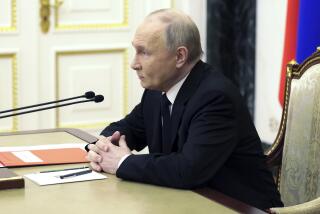Yeltsin Unveils Draft of New Constitution : Russia: Compromise proposal establishes civil and property rights. It also backs aways from earlier plan to give sweeping powers to president.
- Share via
MOSCOW — Russian President Boris N. Yeltsin on Saturday unveiled a compromise draft of a new constitution that enshrines individual civil and property rights and does away with the Soviet-era Congress that has stymied free-market reforms.
The draft would give Russia a bicameral legislature, a presidential term of four years instead of five years and a Constitutional Court whose judges would be appointed by the lower house of the legislature.
The latest blueprint for a post-Communist Russia steps back from Yeltsin’s original draft, which gave the president sweeping powers.
The new draft would restrict the president’s right to dissolve the legislature, and automatically triggers new elections if he does, constitutional scholar Alexander M. Yakovlev told lawmakers.
However, it also makes it tougher for the legislature to impeach the president.
“It incorporates the best of both drafts,” Yeltsin told the 700 handpicked delegates who gathered in the Marble Hall of the Kremlin Saturday in an unusually well-disciplined assembly.
Pressed on whether this constitution would make Russia a parliamentary or a presidential republic, Yakovlev replied: “Life in Russia doesn’t fall under any of the classical formulas.”
But Yeltsin’s former reformist prime minister, Yegor T. Gaidar, who was ousted by the Parliament last December, said he welcomed a document that balances the powers of the two branches.
“It was originally assumed that Russia’s president will always be a real democrat and human rights champion,” Gaidar said, adding that it would be risky to base a constitution on such an assumption.
Despite Yeltsin’s satisfaction with the new draft, Saturday’s session left unresolved two intractable problems.
The first is how to persuade Russia’s autonomy-hungry regions and provinces, especially rebellious and oil-rich Tatarstan, to agree to this constitution.
The draft gives equal rights to all of Russia’s 66 regions and 21 provinces, but Tatarstan has demanded a special constitutional status.
Equally difficult, Yeltsin must now engineer the adoption of the new constitution, if possible without violating the old one.
His archrival, Parliament Chairman Ruslan I. Khasbulatov, is boycotting the constitutional convention and has urged all other lawmakers to do likewise. Though some members of the Congress of People’s Deputies showed up at Saturday’s convention anyway, a Khasbulatov-led Parliament is seen as unlikely to approve any constitution sought by Yeltsin.
Yeltsin bought himself more time on both issues Saturday by giving a new Constitutional Arbitration Commission a week to hammer out the states rights issue.
Yeltsin could call for either a popular referendum--the second mass vote in a year--or new parliamentary elections, hoping that the legislature would agree to adopt the constitutional draft.
He could also create a Constitutional Assembly that would vote to adopt it, a method that many call illegal but that might succeed.
Even as he pushes forward toward a new constitution, and tries to ignore and thus undercut his parliamentary foes, Yeltsin has been wounded by accusations of corruption concerning two of his top officials.
Both Deputy Prime Minister Vladimir F. Shumeiko and Federal Information Center head Mikhail Poltoranin have denied wrongdoing, and Shumeiko has vowed to sue the prosecutor who leveled the charges against him.
Delegates attempted Saturday to oust Shumeiko from the constitutional conference until Yeltsin cut them short. He called the corruption charges a political move to give Parliament a reason to extend its tenure past the elections he hopes to call in the fall.
“I have had so much nerve-racking with the Congress . . . ,” Yeltsin told reporters Saturday. But of the attempt by Parliament to block progress on the constitution, the president said: “I don’t think anything will come of it.”
Russia’s Draft Constitution (Southland Edition)
Main elements of constitution proposed by President Boris N. Yeltsin:
CITIZENS: Rights would be expanded to guarantee freedom to travel and right to own land. Other rights: to vote; to express oneself regardless of gender, race, religion, nationality, language, profession or place of residence; freedom from unsanctioned arrest and denial of citizenship.
PRESIDENT: Would have restricted power to dissolve Parliament, triggering new elections. Would be head of state and commander in chief, popularly elected for no more than two consecutive four-year terms. Other powers: propose legislation; name and dissolve Cabinet; nominate prime minister, judges and Central Bank chairman; declare war or emergency.
PARLIAMENT: Bicameral Federal Assembly would replace Congress of People’s Deputies, dominated by Soviet-era legislators. Federation Council would comprise regional representatives, with two members elected from each region; State Duma would have 400 members elected on proportional basis. Powers: approve budget, initiate and approve legislation, ratify treaties, declare war, approve prime minister and judges, impeach and remove president.
More to Read
Sign up for Essential California
The most important California stories and recommendations in your inbox every morning.
You may occasionally receive promotional content from the Los Angeles Times.









